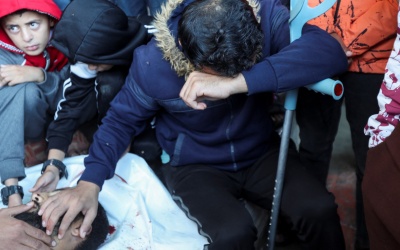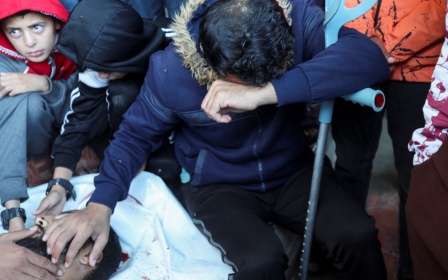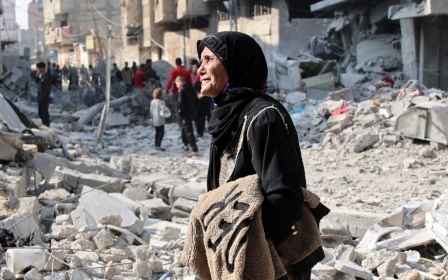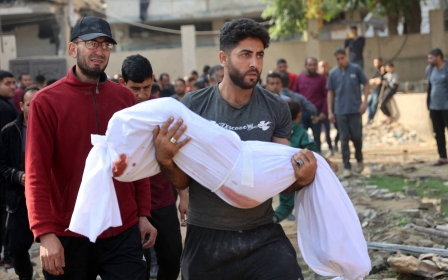Israeli army torches school in north Gaza after aid trucks enter
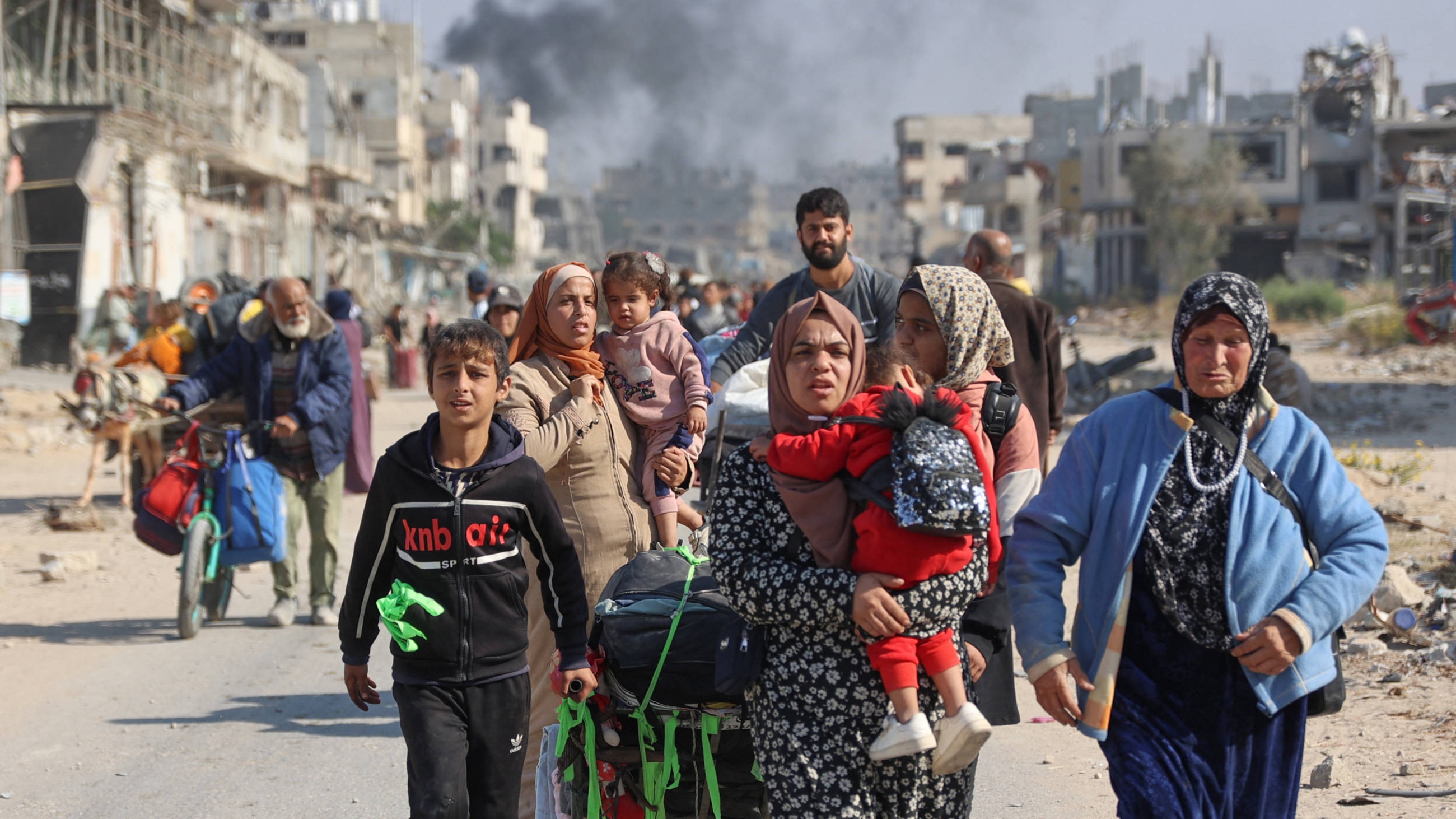
The Israeli military on Tuesday burned down a school that was serving as a shelter for displaced Palestinians in north Gaza after aid trucks had reached the area.
In footage posted online, trucks could be seen lined up as smoke billowed from the Mahdia al-Shawa School in Beit Hanoun. Other clips showed the aftermath of the devastation in the school, where flames could be seen engulfing the building and its surroundings.
According to Al Jazeera, the attack on the school came after the Israeli military ordered displaced Palestinians in the town to flee to the south of the Gaza Strip on Tuesday. Despite allowing aid to enter Beit Hanoun, the Israeli army deepened its incursion into the town, forcing most remaining residents to leave.
Beit Hanoun, home to around 7,500 people, has been under siege for almost 40 days, since Israel launched a fresh military offensive in northern Gaza.
On Tuesday, local media reported that three aid trucks carrying food items and water entered the area for the first time since the blockade began. Simultaneously, Israeli forces shelled the area, killing a number of Palestinians and forcing the rest to flee south.
New MEE newsletter: Jerusalem Dispatch
Sign up to get the latest insights and analysis on Israel-Palestine, alongside Turkey Unpacked and other MEE newsletters
These reports come after the Israeli military made claims over the weekend that aid packages have reached northern Gaza, including Beit Hanoun, noting that additional aid was entering the northern part of the enclave.
However, Israel’s defence ministry told Middle East Eye on Monday that there are currently no planning processes in place to send aid into northern Gaza.
A spokesperson for the defence ministry appeared to blame an absence of "political leadership" for the seeming lack of planning for aid deliveries.
"As no directives have been received from the political leadership on this matter, there are currently no planning processes, tender procedures, or any engagements underway," the spokesperson said.
"The defence establishment continues and will continue to operate solely in accordance with the government's directives and in compliance with international law."
The statement was sent to MEE in response to questions about a proposal by a US logistics firm to establish an aid distribution hub and a "gated community" in Beit Hanoun in northern Gaza.
Last month, the US imposed a 30-day deadline, which expired on Tuesday, for Israel to improve aid deliveries across Gaza or face potential restrictions on military cooperation.
'Policy of starvation and genocide'
Israeli strikes killed at least 22 Palestinians across the Gaza Strip on Wednesday, including in attacks on Beit Lahia and Gaza City in the north, Nuseirat in central Gaza, and Rafah in the south.
The government media office in Gaza said on Tuesday that Israel has killed more than 2,000 Palestinians, mostly women, children and elderly people, in the north in the past 38 days.
Ismail al-Thawabta, the director-general of the media office, blamed the United States, Britain and certain European countries for the situation on the ground, saying that they are "partners in the policy of starvation and genocide."
He added that Israel has misled the world into believing it is "providing aid, establishing field hospitals and expanding humanitarian areas," and instead, it has bombed its designated safe zones, killing and wounding a large number of people.
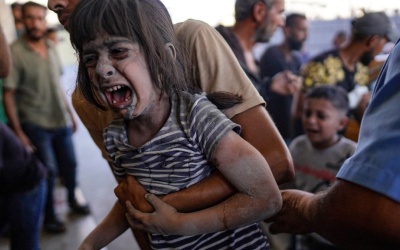
Thawabata also indicated that Israeli restrictions on access to aid "are fuelling the humanitarian crisis in the Strip in an unprecedented manner."
The lack of aid in the north and Israel's failure to meet US-set guidelines on aid distribution has been criticised by international aid groups in a 19-page report.
"Israel not only failed to meet the U.S. criteria that would indicate support to the humanitarian response, but concurrently took actions that dramatically worsened the situation on the ground, particularly in Northern Gaza," a group of eight organisations, including Oxfam, Save the Children and the Norwegian Refugee Council, said.
Louise Wateridge, the senior emergency officer for the UN agency for Palestinian refugees (Unrwa) in Gaza, warned in a press briefing that no food was allowed entry into the north for over a month.
"The people here need everything. They need more. It's not enough," she said.
"Anything that happens now is already too late. Thousands and thousands of people have been killed senselessly. They have been killed because there is lack of aid, because the bombs have continued and because we have not been able to even reach them under the rubble," Wateridge added, in response to a question about what was expected of the US following its aid distribution deadline for Israel.
On Friday, the Famine Review Committee (FRC) issued a rare alert, warning of a strong likelihood of imminent famine in parts of northern Gaza amid Israel's blockade and new offensive.
Meanwhile, a report earlier this week by the United Nations Office for the Coordination of Humanitarian Affairs (OCHA) noted that humanitarian access to Gaza, particularly in the north, was "extremely limited".
Of the 98 registered attempts for coordinated movements of aid to northern Gaza through the checkpoint along Wadi Gaza, only nine were able to access the area without issues, the OCHA said.
Moreover, the denial of overall aid facilitation requests in Gaza has risen to 43 percent in recent months, with the Israeli army impeding a further 16 percent.
Middle East Eye delivers independent and unrivalled coverage and analysis of the Middle East, North Africa and beyond. To learn more about republishing this content and the associated fees, please fill out this form. More about MEE can be found here.


